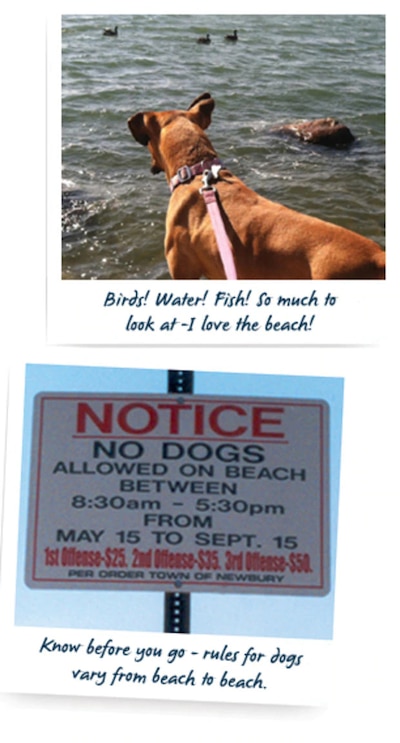Through no fault of their own warm hearts and wet noses, dogs can cause some serious impacts on the seashore. But with some common sense, a leash, and a baggie, you can enjoy a guilt-free beach day with your canine companion. This CZ-Tip looks at how to responsibly manage dogs at the coast and gives information on dog-friendly coastal beaches throughout Massachusetts.
Respect Leash Laws
According to DogFriendly.com's Dog Etiquette for the Dog-Friendly Beach, "Based on a recent unscientific poll…, the top reason for banning dogs from beaches is the disregard for leash laws." Unleashed dogs, covered in sand and salt water, can create unpleasant conflicts when approaching people and pets. So please respect other beachgoers (on both two and four legs), and keep your pooch leashed. Respect for leash laws also helps ensure that dog-friendly beaches can stay that way.
Give Birds a Break
On Massachusetts beaches, birds are particularly vulnerable to dog disturbance throughout the spring and summer—from mating season in early spring, to the nesting period from mid-April through late July, and throughout the first few weeks of fledged life when chicks learn to fly and find food. To help protect our feathered friends, especially these threatened and endangered species—the Roseate Tern, Common Tern, Arctic Tern, Least Tern, and Piping Plover—keep dogs on leash and away from shorebirds. (See CZ-Tip - Birdwatching on the Coast for details on these bird species.) For more useful suggestions, see Nine Beach Bird Safety Tips For A Successful Summer At The Beach.
Steer Clear of Wildlife
In addition to birds, Massachusetts marine waters are home to seals, turtles, and other wildlife—and not all sea creatures found on land are in trouble (but they can cause trouble for your dog and vice versa). Seals, for instance, often look stranded when they haul themselves up on land to rest, and baby seals look abandoned when their mother temporarily leaves them in a safe place while searching for food. Whatever large animal you find, for the safety of you, the animal, and your dog, keep at least 150 feet away. If you do find a beached whale, dolphin, or sea turtle, call NOAA Fisheries Greater Atlantic Marine Mammal and Sea Turtle Reporting Hotline at 866-755-6622. (The main line will filter you down to the appropriate local contact based on your sighting of a live entangled Right Whale, free-swimming Right Whale, or injured, stranded, or entangled marine mammal or turtle.) For sightings on Cape Cod, call the International Fund for Animal Welfare (Marine Mammal Rescue and Research) at 508-743-9548 or the Center for Coastal Studies (Marine Animal Entanglement Response) at 800-900-3622.
Keep Off the (Dune) Grass
Coastal dunes provide tremendous storm-damage protection to inland areas thanks to the dune grasses and other plants with extensive roots that naturally hold the sand in place. These otherwise hardy plants are extremely vulnerable to trampling by both feet and paws, however. In addition, simply walking on dunes causes sand-landslides that further destabilize the area. So, never walk on or over a sand dune—stick to the designated walkways to reach the beach and keep your dog at your side.
Scoop the Poop
Clearly, common courtesy calls for you to protect barefoot beach walkers by cleaning up your dog's droppings. But this is more than mere courtesy, it's a matter of public health and environmental protection. According to the Massachusetts Executive Office of Health and Human Services Pet Waste and Bathing Beaches web page, dog waste can cause some nasty infections in humans—from Giardiasis (which can cause diarrhea, cramping, fatigue, and weight loss) to Toxocariasis (which can cause vision loss, rash, fever, or cough, and is a particular threat to children exposed to parasite eggs in sand and soil). And it's not just droppings on the beach that are a problem. The Massachusetts Department of Environmental Protection's Nonpoint Source Pollution Education: Managing Pet Waste page explains that dog waste left on lawns, roads, woodlands, and other surfaces is washed into rivers, streams, and ultimately the sea. The results? Closed swimming beaches and shellfish beds. The solution? Always pick up your dog's waste and properly dispose of it. Dog Waste and Surface Water Quality (PDF, 1.1 MB), a publication of the Massachusetts Department of Conservation and Recreation, gives information about the pet waste problem and specific disposal tips to help protect water quality.
Safety First
Did you know that not all dogs can swim? That canines can get sunburn? That sampling the salt water is bad for your pooch? For 10 tips to ensure that your day at the dog beach is a happy and healthy one, see GoPetFriendly.com's Keeping Your Dog Safe at the Beach page.
Find a Dog-Friendly Beach
Now that you know the dos and don'ts of dogs at the seashore, it's time to find a Massachusetts beach that welcomes you and your four-legged friend. But keep in mind that many beaches restrict dogs during the summer. These resources can help you make a coastal canine connection (just be sure to check directly with your chosen destination for any updated rules and limitations):
- Top Dog Friendly Beaches in Massachusetts by BringFido.com includes a top 10 list of dog beaches in the Bay State, along with more than 30 other beach destinations, complete with descriptions, maps, photos, and reviews.
- Dog-Friendly Beaches in Massachusetts from New England Dog Travel lists dozens of beaches.
- Cape Cod's Dog Friendly Beaches in Cape Days, Your Go To Cape Cod Guide, gives some specific information on beaches open to dogs in this region.
- Dog Friendly Cape Cod Beaches by capebeachdog.com highlights Cape Cod beaches that are open to dogs in the summer.
For specific details on bringing dogs to state parks in Massachusetts, see the Dogs in DCR Parks guide.

